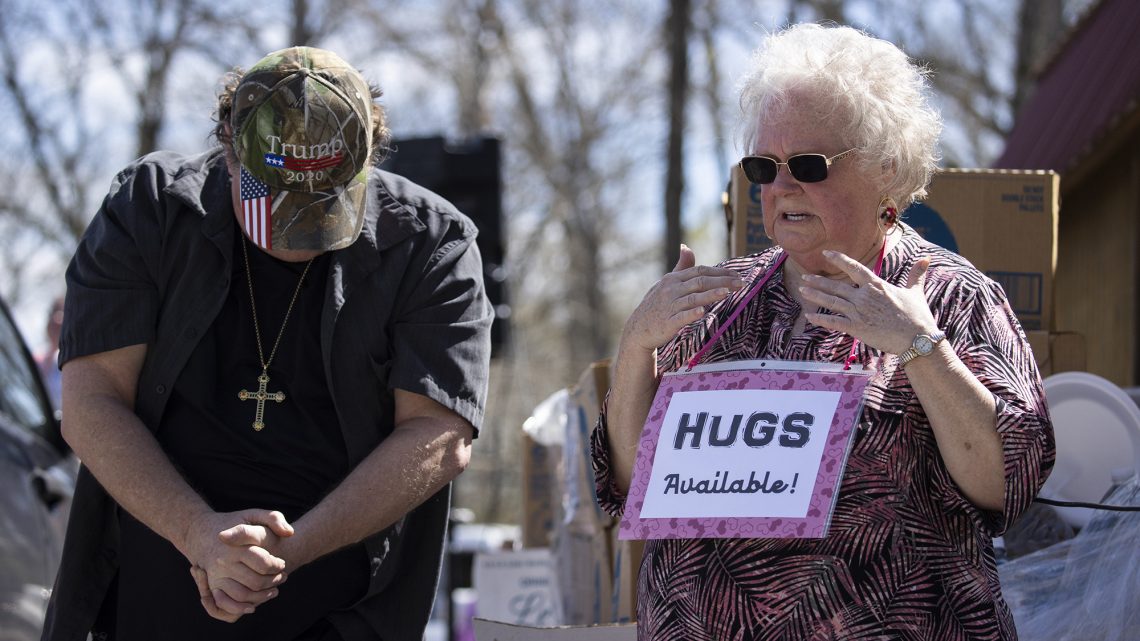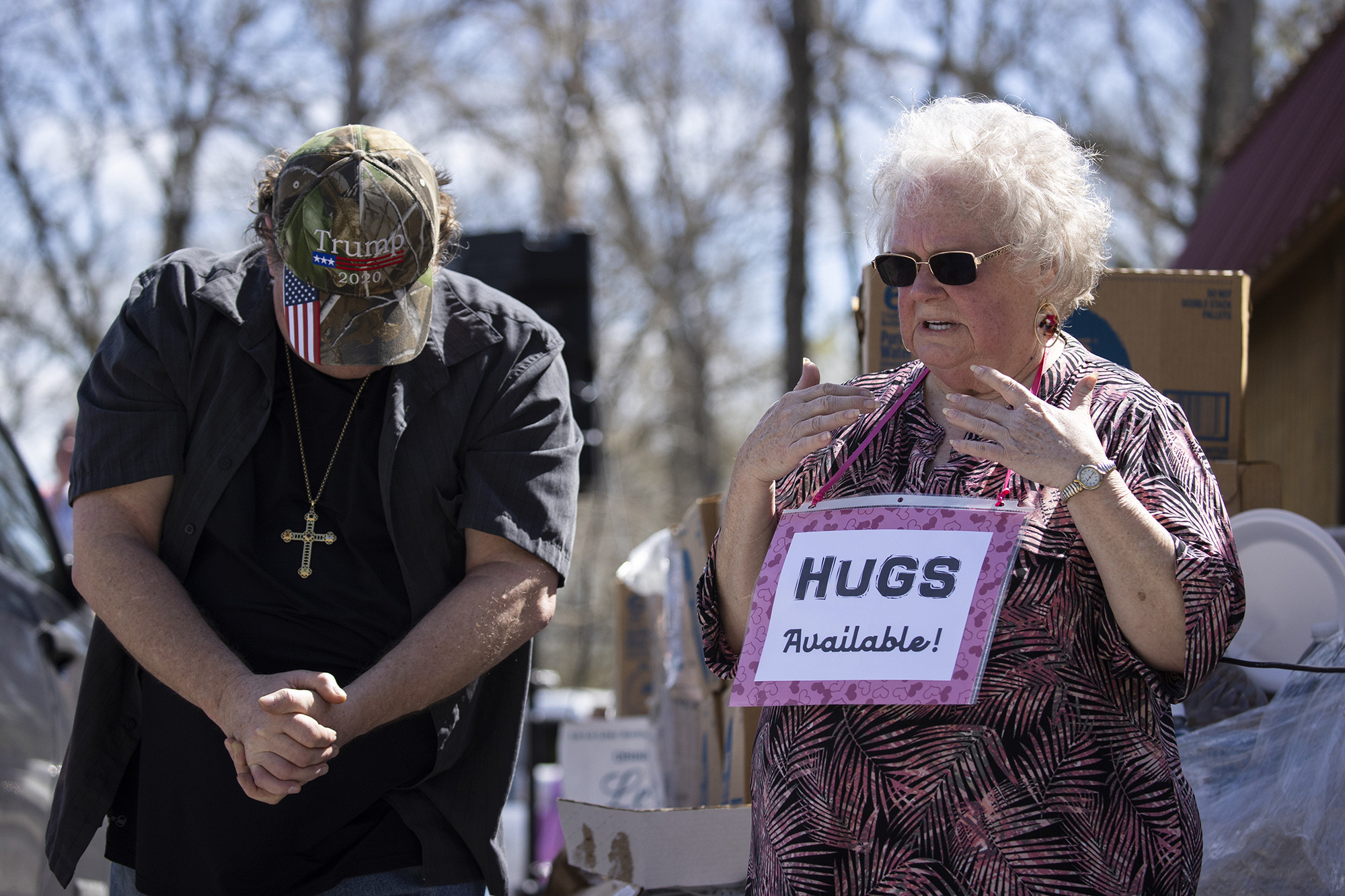
Church Services During Coronavirus Are Just a Modern Form of Snake-Handling
April 13, 2020This weekend, despite the advice of health experts, federal authorities, and state officials, many churches held Easter services.
At the Awaken church in Jonesboro, Arkansas, worshipers were still welcome to congregate as long as they "avoid entering the facility if they have a cough or fever; maintain a minimum six-foot distance from one another; sneeze and cough into one’s elbow; not shake hands or engage in any unnecessary physical contact," according to a statement provided to VICE by the church, which is also livestreaming services.
In the midst of a pandemic that's claiming thousands of lives each day in the US alone, there have been serious concerns about churches defying recommendations, and even orders, to close their doors and protect their communities. But taking bodily risks in church is nothing new; the argument that holy powers can protect followers from harm is deep-rooted in America's Bible Belt.
The first snake-handling religious services were held in the early 1900s at the Church of God with Signs Following, a Pentecostal Holiness church in rural Tennessee. George Went Hensley, a then-unlicensed minister at the church, had developed an intense fascination with a verse in the Gospel of Mark, in which a just-risen Jesus appeared to his disciples and said that they should preach his gospel throughout the world. Those who believed, Jesus said, would be able to cast out demons, speak in tongues, pick up snakes, drink poison, and heal the sick. Hensley took those words quite literally, and has been credited with introducing snake handling—and the occasional mid-service shot of strychnine or battery acid—to his church in Tennessee, before taking the practice to other communities and other churches throughout the American South.
By the mid-1940s, some states started to pass laws prohibiting the handling of poisonous snakes during religious services, but the threat of a misdemeanor wasn't much of a deterrent for so-called True Believers. More than a half-century later, tiny congregations in many of those same Appalachian communities still open dusty Rubbermaid boxes filled with sluggish but no-less-lethal snakes, passing them from person to person as a test of their faith.
One of the most well-known present-day snakehandlers is Jamie Coots, a Pentecostal preacher at the Full Gospel Tabernacle in Jesus' Name. The fourth-generation handler was featured in a multi-part NatGeo documentary, and amateur footage of Coots enthusiastically bouncing in his church's basement sanctuary as he holds a coiled snake above his head is still available on YouTube.
"People who don't believe in it are gonna say anything to try and discredit us, you know, to say that it's not God actually doin' it," Coots told NPR in 2013, addressing critics who questioned whether his snakes were too sick or malnourished to actually hurt him. Less than six months later, Coots was dead, from a rattlesnake bite he sustained during a Saturday evening service.
George Went Hensley died from a tent-revival snakebite, too. "The snake would not have struck if fear had not come over someone here," a witness claimed Hensley said, blaming the bite on some half-believer in the crowd. (His fourth wife casually accepted his death as "God's will.")
In the middle of an honest-to-God pandemic, it's hard not to see Hensley and Coots as semi-related cautionary tales for the churches that ignore statewide stay-at-home orders and continue holding in-person services, and for the ministers who have suggested that "the power of God" will prevent the faithful from contracting coronavirus.
The Awaken Church is still going ahead with its regular schedule, despite the state's guidelines advising against gatherings of more than 10 people. "For us to not have services due to a virus would be for us to go against our extremely strong convictions of the power of God to protect and the power of God to heal," the church wrote in a Facebook post last week. "Jesus knew the world He was sending us into contained sickness and disease. Instead of telling us to retreat from sickness, He told us to go into the world and to heal the sick." (The church has also increased spacing between groups within the church, discouraged the elderly and immunocompromised from attending in person, and offered hand sanitizer to all visitors.)
But coronavirus doesn't discriminate between the faithful or the non-believers, and churches have already been at the center of some significant outbreaks of the disease. Lee Norman, the secretary of the Kansas Department of Health and Environment, said that three of the state's 11 known clusters of coronavirus are connected to church gatherings. Health officials in California have reported that a church near Rancho Cordova was responsible for more than 70 cases, and a "higher than expected number of positive cases" were associated with a separate church congregation in Redding.

Last week, the friends and family of Pastor Landon Spradlin mourned his death from coronavirus, which they believe he caught while attending Mardi Gras in New Orleans. "His mission was to go into pubs, clubs and bars, play the blues and connect with musicians and just tell them that Jesus loved them," his daughter told the BBC.
In mid-February, Spradlin criticized the "hysteria" about coronavirus on his Facebook page, and shared a post suggesting that the media's focus on the illness was a "politically motivated ploy to harm President Trump." (His son clarified that Spradlin "knew it was a real virus," but was frustrated with the media coverage that surrounded it.)
Rev. Dr. Timothy J. Luoma, the pastor of First Presbyterian Church in Plattsburgh, New York, doesn't agree with some other pastors' decisions to keep their churches open, or with their Biblical justification for it.
"When hearing people say that they should knowingly risk their health and rely on God to protect them, my reply is 'Do you know who suggested to Jesus that He should put God to the test? Literally the Devil," he told VICE, quoting a Lenten reading from Matthew. "Churches should be closed right now for the same reason that schools are closed and restaurants are closed and movie theaters are closed and anywhere else that people gather in crowds are closed: because the people who know the most about how to control infectious diseases have told us not to gather.
"Furthermore, we’re seeing clear evidence that those places and those countries which are doing this are having success as limiting the spread of the virus [...] No one is saying that we should never meet in person again. We’re saying that we shouldn’t meet in person for a time. And that time should be determined not by politicians or religious leaders, but by scientists and doctors."
Luoma also contends that holding services right now isn't "going out into the world," as the Awaken Church wrote on social media. "Holding worship services is not going out into the world, it’s retreating to the safety of the known and comfortable. If you feel a call to go work with the poorest of the poor and want to forego your own safety, comfort, and health in order to care for them, by all means go, but that seems completely different to me than deciding that you’re going to put your health and the health of others at risk so you can do what you want to do with a bunch of people you call friends," he said.
"To be clear, I miss my congregation terribly. In 22 years of ministry, I haven’t missed more than six or eight Sundays in an entire year. In the weeks before the CDC recommendation to stop meeting in person, I had stopped shaking hands at the door to the church after worship, and I did that to protect them much more than myself. Right now, I would sooner chain myself to the doors of the church rather than let them get together."
As of this writing, 14 states have exempted religious gatherings from their stay-at-home orders, and we have yet to see what the consequences of those packed pews on Easter Sunday might be. “This is not a time to hide, this is not a time to chicken out and this is not a time to listen to online sermons only," Pastor Rich Vera told his congregation at the Center Arena in Orlando, Florida last weekend. "This is a time to gather together in his presence.”
A flyer on Vera's website says that he is "personally inviting you and your family" to join him in taking communion at the church. "Bring the sick, expect a miracle!" he wrote.
Luoma still takes issue with the in-person approach right now.
"Let me be clear: I believe communal worship is important, even essential. The easiest way to do that and the most familiar way to do that is meeting together in person, but it’s not the only way to do it," he said. "The church is not an 'essential business,' because the church is not a business, but caring for one another is the 'essential business' of the church. Right now, that care means staying home."


